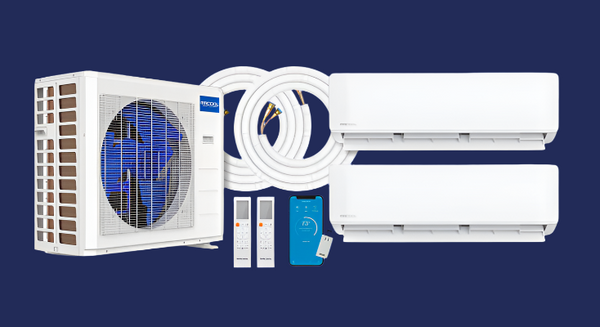The HEATR Act: How It’s Transforming Home Energy Efficiency & Saving You Money
In today’s world, energy efficiency and sustainability are more than just buzzwords—they're central to homeowner decision-making and national energy policies. At the forefront of this movement is the Home Energy and Air-conditioning Transition (HEATR) Act, a groundbreaking piece of legislation designed to help homeowners transition to high-efficiency heating and cooling systems.
If you’re looking to upgrade your HVAC system, the HEATR Act could save you thousands while helping reduce your environmental footprint. Let’s explore how this legislation works, what benefits it offers, and how you can take full advantage of its incentives.
🔹 What Is the HEATR Act?
The HEATR Act is a legislative initiative aimed at reducing household energy consumption by incentivizing homeowners to switch to energy-efficient heating and air conditioning systems. Recognizing that HVAC systems contribute significantly to residential energy use, this act provides financial incentives, structured guidelines, and funding support to make eco-friendly home upgrades more affordable.
🌍 Why Does the HEATR Act Matter?
✔️ Encourages adoption of high-efficiency HVAC systems
✔️ Reduces energy waste and greenhouse gas emissions
✔️ Lowers homeowners' utility costs
✔️ Provides financial incentives like tax credits and rebates
💡 By transitioning to high-efficiency heating and cooling, you can reduce both your energy bills and your carbon footprint!
🔹 Key Provisions of the HEATR Act
The HEATR Act is packed with consumer-friendly incentives aimed at making energy-efficient HVAC systems more affordable and accessible.
1️⃣ Tax Credits & Rebates 💰
One of the biggest benefits of the HEATR Act is its tax credits and rebates for homeowners who install qualifying energy-efficient HVAC systems. These incentives help offset the higher upfront cost of high-efficiency systems, such as:
✔️ Heat pumps (air-source and ground-source)
✔️ High-SEER air conditioners
✔️ Energy-efficient furnaces
💡 How Much Can You Save?
✅ Federal tax credits can cover a significant portion of your new system's cost.
✅ State & local rebates offer additional savings, depending on your location.
2️⃣ Phase-Out of Inefficient HVAC Systems 🏡
The HEATR Act also supports the gradual phase-out of older, inefficient heating and cooling units, which:
❌ Consume excessive energy
❌ Drive up electricity costs
❌ Contribute heavily to greenhouse gas emissions
💡 By replacing your old HVAC system with a HEATR Act-approved model, you'll experience: ✔️ Lower monthly energy bills
✔️ Better home comfort with consistent heating & cooling
✔️ Fewer breakdowns and maintenance costs
3️⃣ Financial Assistance for Low-Income Households 🏠
Recognizing that not all homeowners can afford energy-efficient upgrades, the HEATR Act includes special provisions for low-income families, such as:
✔️ Subsidized installation programs
✔️ Grants for full or partial HVAC replacements
✔️ Lower upfront costs for energy-efficient systems
💡 This ensures that sustainable heating & cooling isn’t just for high-income households—it’s for everyone!
🔹 Top Benefits of the HEATR Act
🌱 1. Environmental Impact
✔️ Reduces carbon emissions by replacing outdated, high-energy-consuming units.
✔️ Lowers electricity demand, reducing strain on the power grid.
✔️ Encourages renewable energy solutions like heat pumps & smart HVAC systems.
💰 2. Long-Term Cost Savings
✔️ High-efficiency systems consume less power, leading to significantly lower monthly utility bills.
✔️ With available rebates & tax credits, you can recover a large portion of your initial investment.
✔️ Fewer maintenance issues & longer system lifespan mean more savings over time.
💨 3. Improved Indoor Air Quality & Comfort
✔️ Modern energy-efficient HVAC systems come with advanced filtration, reducing dust, allergens, and airborne pollutants.
✔️ Zoned temperature control allows for customized comfort in different rooms.
✔️ Quieter operation compared to older, inefficient systems.
💡 If you suffer from allergies or asthma, upgrading to a HEATR Act-compliant HVAC system could drastically improve your indoor air quality.
🔹 How to Take Advantage of the HEATR Act
1️⃣ Assess Your Current HVAC System
✔️ If your system is 10–15+ years old, it’s likely less efficient and costing you more in energy bills.
✔️ Consider upgrading before federal & state incentives expire.
2️⃣ Research Eligible HVAC Systems
Look for high-SEER (Seasonal Energy Efficiency Ratio) air conditioners, ENERGY STAR® certified heat pumps, and high-AFUE furnaces to qualify for incentives.
💡 Popular options include:
✔️ Ductless mini-splits (great for zoned heating & cooling)
✔️ Air-source heat pumps (excellent energy efficiency)
✔️ Geothermal heat pumps (best for long-term savings)
3️⃣ Consult an HVAC Professional
✔️ Work with certified HVAC technicians to ensure you’re selecting a HEATR Act-compliant system.
✔️ Get expert advice on installation, system sizing, and additional rebates.
💡 Pro Tip: Many professionals offer free consultations, helping you determine the best system for your needs.
4️⃣ Apply for Tax Credits & Rebates
✔️ Claim federal tax credits during your next tax filing.
✔️ Check for Missouri state rebates and utility company incentives for even more savings.
✔️ Register your new HVAC system to ensure warranty protection.
🔹 The HEATR Act: A Win for Homeowners & the Planet
The HEATR Act isn’t just about saving money on energy bills—it’s about creating a cleaner, greener future. By upgrading your HVAC system, you’ll:
✅ Lower your home’s energy consumption
✅ Reduce harmful carbon emissions
✅ Improve indoor air quality & year-round comfort
✅ Maximize savings with tax credits, rebates & energy-efficient technology
🔥 Don’t wait! Upgrade your HVAC system today and take full advantage of HEATR Act savings.
📌 Shop energy-efficient HVAC systems now at www.mrcooldiydirect.com and start saving!




